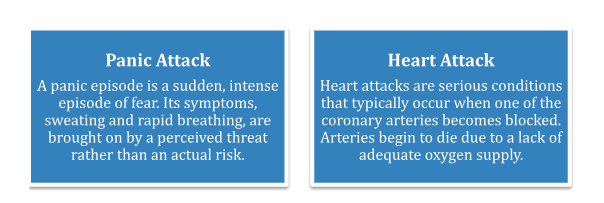
Panic attacks and heart attacks (medically termed myocardial infarctions) are extremely frightening conditions. They come suddenly with chest tightness, cold sweat, and shortness of breath. However, both triggers have different causes. Distinguishing between a panic attack and a heart attack might be difficult during emergency scenarios. Your mind will race at double pace if you encounter this for the first time. In this blog, let us explore the differences between panic attacks and heart attacks and how we can manage them effectively.
Understanding Panic Attacks Vs Heart Attacks

Both attacks share common symptoms, which makes them challenging to identify. However, the duration is a vital factor for determining if it is a panic attack or a cardiac event. Panic attacks pass within a few minutes; on the other side, heart attacks don't go away. Panic attacks typically stay at the chest whereas, in a heart attack, the pain radiates from the centre of the chest to the arm, neck, and jaw.
Causes & Symptoms
The extreme fear or worry that gets heightened by the body's fight-or-flight reaction is usually what causes panic attacks. A cardiac attack is triggered by a shortage of blood supply to your heart due to an obstructed artery.
Knowing common symptoms is crucial to understanding the difference between panic attacks vs heart problems.
Common Heart Attack Symptoms
-
Sudden onset during or following physical activity
-
Pain that rays to the arm, jaw, or shoulder
-
Pain gets worse over time
-
Near fainting situation
-
Sweating
Common Panic Attack Symptoms
-
Increased or racing heart rate
-
Extreme anxiety
-
Shortness of breath
-
Sweating
-
Tingling in the hands
Consult our cardiologist in Salem If you are experiencing heart attack symptoms.
Diagnosis and Treatment
Signs of panic attack disorder and heart attack are similar to a great extent but treated differently.
Heart attacks are a medical emergency that needs precise diagnosis and medical intervention. If you encounter a heart attack, your doctor will check your vitals (blood pressure, pulse, and temperature) and based on these parameters, the treatment will begin immediately. Tests like Electrocardiogram (ECG), Blood tests, Echo, Chest X-ray, and Coronary angiogram can also be a heart attack diagnosis during checkups. Heart attack treatment involves restoring the blood flow that is obstructed by blocked arteries – this can be done through Medications (blood-thinning drugs, statins, beta-blockers, etc.), Angioplasty and Stenting, and Coronary Artery Bypass Surgery (CABG) to treat severe blockage in arteries.
Cardiac rehabilitation is important to prevent the occurrence of future heart attacks. It is primarily focused on patient education on exercise, a heart-healthy diet, stress management, and a gradual return to daily activities.
Panic attacks are usually not a medical emergency and can be managed at home. Stress is a major culprit for panic attacks, thus, stress management techniques can help people calm themselves during such scenarios. Cognitive Behavioural Therapy (CBT) is an effective therapy that trains individuals on how to identify panic attack triggers and respond to them. It may reduce the frequency and severity of panic attacks, eventually preventing them from recurrence. Getting regular sleep and exercise, and practicing relaxation techniques like deep breathing and yoga may also help. However, if your symptoms become worse with time or you’re not sure, seek immediate medical assistance. Consult our Cardiology hospital in Salem to assess your health and find your ideal panic attack treatment plan.
FAQ's
Panic attacks trigger at any time and last for a few minutes. A heart attack occurs when heart arteries become obstructed. Unlike panic attacks, heart attacks are intense, and chest pain may radiate from the chest to the arm and neck and worsen over time.
Stressful situations may cause a panic attack. Anxiety attacks, pain, and symptoms might linger anywhere from a few minutes to twenty minutes.
Panic attacks may include these signs:
-
Chest pain and trouble breathing
-
Sweating and trembling
-
Weakness or dizziness
-
Stomach pain or nausea
-
Sudden feelings of anxiety and fear



















 4 Min Read
4 Min Read






.png)







